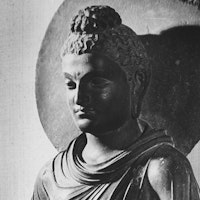Drop by drop is the water pot filled. Likewise, the wise one, gathering it little by little, fills oneself with good.
Gautama Buddha

Drop by Drop
Topic: Spiritual Growth & Practice
Think not lightly of good, saying, “It will not come to me.”
Drop by drop is the water pot filled.
Likewise, the wise one, gathering it little by little,
fills oneself with good.
Gautama Buddha, also known as Siddhartha Gautama, was a spiritual teacher and the founder of Buddhism. Born in the 6th century BCE in Lumbini, now modern-day Nepal, he was destined for greatness. At the age of 29, he renounced his luxurious life as a prince and embarked on a spiritual quest to find the ultimate truth about human suffering and the nature of existence.
After years of intense meditation and self-discipline, Gautama attained enlightenment under a Bodhi tree in Bodh Gaya, India, at the age of 35. He became the Buddha, which means "the awakened one" or "the enlightened one." Gautama Buddha spent the rest of his life teaching the Four Noble Truths and the Eightfold Path, which formed the core principles of Buddhism. His teachings emphasized the importance of overcoming desire and attachment to achieve liberation from suffering. Known for his compassion and wisdom, Gautama Buddha's teachings have had a profound impact on millions of people worldwide, inspiring them to seek inner peace and spiritual enlightenment. His legacy as a spiritual leader and philosopher continues to resonate and guide individuals on their spiritual journeys to this day.
Dhammapada
Hanson, Rick, and Forrest Hanson. Resilient. Random House, 2018, p. 49 [Buddha, Dhammapada 122].

Gautama Buddha
Theme: Spiritual Growth

Dhammapada 9.121-22
Buddha Shakyamuni
Verse 122. Merit Grows Little By Little
Huston Smith [excerpt from The World’s Religions, Buddhism, the Eightfold Path]
“The West has found the last two steps in the Eightfold Path [Right Mindfulness and Right Concentration] of special importance for the understanding of the human mind and its workings… No teacher has credited the mind with more influence over life than did the Buddha. The best-loved of all Buddhist texts, the Dhammapada, opens with the words, “All we are is the result of what we have thought.” And, respecting the future, it assures us that “all things can be mastered by mindfulness.”
Carl Rogers [Humanistic Psychology] writes, “human behavior is to be trusted, for in these moments the human organism becomes aware of its delicacy and tenderness towards others.” The Buddha saw ignorance, not sin, as the offender. More precisely, insofar as sin is our fault, it is prompted by a more fundamental ignorance — most specifically, the ignorance of our true nature.”
—Huston Smith [excerpt from The World’s Religions, Buddhism, the Eightfold Path, 7. Right Mindfulness and 8. Right Concentration] pp. 109-110.
Rick Hansen [excerpt from Neurodharma, New Science, Ancient Wisdom, and Seven Practices of the Highest Happiness]
“As you read these words, millions of neurons inside your head are pulsing in rhythm together, producing waves of electrical activity. As the neuroscientist Charles Sherrington put it, the tapestry of our experiences is being woven by an enchanted loom.” … Scientists have been finding connections between helpful, even transformational experiences and underlying neural activity—and we can use these links between mind and body in practical ways. For example… you can activate neural factors of present-moment awareness, calm strength, and compassion. Over time, these useful mental states can be gradually hardwired into your nervous system as positive traits.” And psychologist Rick Hanson goes on to write, ” This process of physical change occurs because all of our experiences involve patterns of neural activity. And patterns of neural activity—especially when repeated—can leave lasting physical traces behind. This is neuroplasticity, the capacity of the nervous system to be changed by the information flowing through it… In a saying from the work of the psychologist Donald Hebb, neurons that fire together wire together. This means that you can use your mind to change your brain to change your mind for the better… Mental activity and neural activity thus affect each other. Causes flow both ways, from the mind into the brain . . . and from the brain into the mind. The mind and brain are two distinct aspects of a single, integrated system. As the interpersonal neurobiologist Dan Siegel summarizes it, the mind uses the brain to make the mind.”
—Rick Hansen [excerpt from Neurodharma, New Science, Ancient Wisdom, and Seven Practices of the Highest Happiness, 2. The Enchanted Loom] pp. 24-28.
Resources
Related Quotes
Copyright © 2017 – 2025 LuminaryQuotes.com About Us